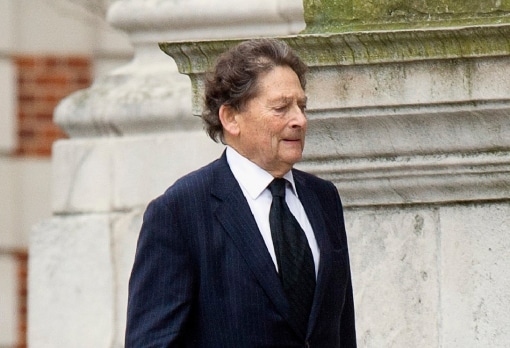Lord Lawson faces further embarrassment concerning his climate denial Global Warming Policy Foundation (GWPF), as the UK transparency watchdog has ruled that the Charity Commission must reconsider releasing files from a 2014 investigation.
Two years ago the Charity Commission conducted an investigation into the GWPF following complaints from the public that the charity was engaging in politics – this led to Lawson setting up the sister organisation: the Global Warming Policy Forum.
DeSmog UK commissioned a freedom of information request to the Charity Commission to force the release of the investigation files, so that the public could better judge whether the former chancellor had used the GWPF for non-charitable ends.
The Charity Commission originally refused the appeal on the grounds that it, along with a series of other requests, was vexatious – intended to cause disruption or annoyance. The Information Commissioner’s Office (ICO) has now ruled against the Commission and demanded it consider releasing the documents.
This comes at the same time as ministers announced plans on January 7 to extend freedom of information laws to cover charities. Currently, charities are exempt from the information laws despite the fact that many receive tens of millions of pounds in grants funded by the taxpayer.
While the GWPF is funded by private donations, if the law is expanded this could see the charity face heightened scrutiny over its activities with the public able to submit freedom of information requests to the charity directly.
Murky Interactions
Bob Ward, policy and communications director at the Grantham Research Institute on Climate Change and the Environment at the London School of Economics, was among those to complain about the GWPF’s activities
He told DeSmog UK: “There has been a lot of murkiness about the Charity Commission’s interactions with the GWPF in relation to its multiple breaches of charity rules by promoting inaccurate and misleading information.
“The foundation has continued to break charity rules even after it created a new lobbying arm, the Global Warming Policy Forum, to circumvent them.
“It is time for the Commission to come clean about its dealings with Lord Lawson and the other trustees of the foundation so that the public can have confidence that charity rules are being upheld.”
The ICO‘s decision comes less than a month after Greenpeace revealed significant flaws in the GWPF’s peer review process as one of its academic advisors agreed to write a report extolling the benefits of carbon dioxide on behalf of a fictitious oil company.
These revelations have since been incorporated into Charity Commission’s current investigation into the GWPF.
Charity Status
Following complaints from members of the public and a thoroughgoing investigation ending in the summer of 2014, the Charity Commission forced the GWPF to split into separate charitable and campaigning arms. The freedom of information request was made shortly after by Request Initiative on behalf of DeSmog UK.
What did the ICO decide?
- The Charity Commission argued that the requests had “limited value and purpose”. DeSmog UK explained that the request was made as part of an investigation into the activities of the GWPF in relation to climate change denial. The ICO does not agree with the Charity Commission that the request in this case has limited purpose or value.
- The Charity Commission tried to get out of releasing the GWPF investigation file on the basis that it was already overburdened by freedom of information requests about the charity. The Information Commissioner “does not consider that the complainant can be said to have made a significant amount of requests…this averages out at less than four requests per year.”
- The Charity Commission said that dealing with the requests placed a significant burden upon it, but it failed to elaborate or provide detail on the time and cost implications of completing this work. Based on this, the ICO was “not persuaded that responding to the request would have imposed a significant burden, even when considered in the context of the earlier requests.”
As Request Initiative argued: “The Global Warming Policy Foundation has been described as ‘the UK’s most prominent source of climate change denial.’
“Their mission itself still states that its aims are to critique policy and that the GWPF has ‘opened the debate on climate policies among opinion formers and MPs’.
“We also know that the GWPF has been one of the most complained about charities over the last few years.
“The Charity Commission after investigating the GWPF found that the charity had in fact ‘blurred fact and comment’ and was failing as a charitable organisation in that the main purpose of the foundation was political, not charitable.
“There is a huge public interest in both knowing how the Charity Commission itself functions in response to complaints against charities and also to understand how the GWPF may have influenced politicians and policy whilst benefiting from being a charity.”
New Response
Despite this argument, in May 2015 the Charity Commission refused to release any documents on the grounds that the request was “vexatious”.
However, the ICO has now ruled – after a six-month decision period – that this refusal was incorrect.
Brendan Montague, editor of DeSmog UK, said: “The Charity Commission finds itself in a very difficult position.
“It is stuck between the rock of Lawson and his expensive lawyers and the hard place of dealing with dogged campaigners acting in the public interest to ensure charities are not just PR fronts for vested interests. I don’t envy them.”
The Charity Commission now has 35 days to issue a new response to the original freedom of information request.
Subscribe to our newsletter
Stay up to date with DeSmog news and alerts







